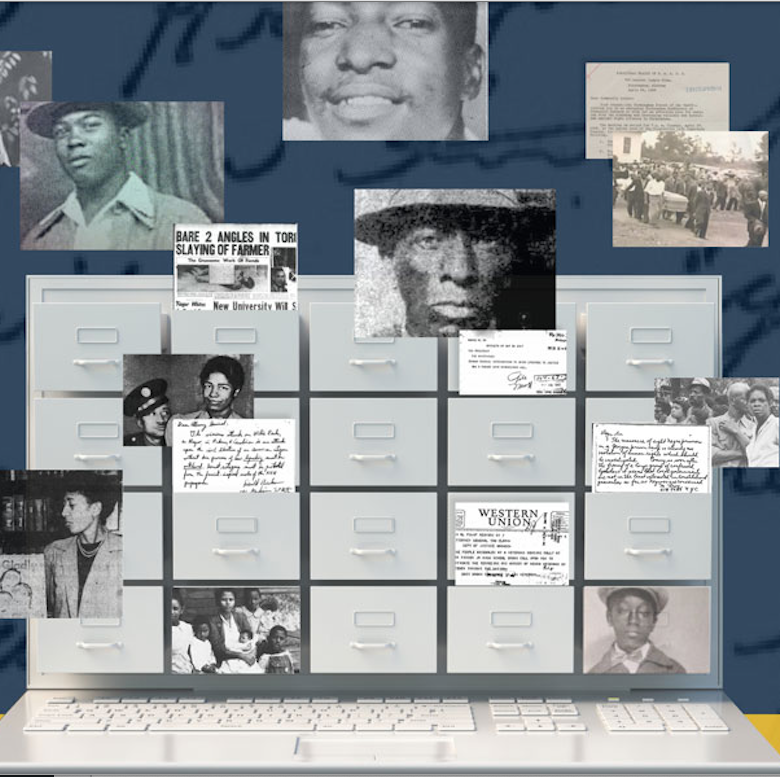1,000 Racial Homicides Investigated in Unprecedented Burnham-Nobles Digital Archive

09.27.22 — Today, the Civil Rights and Restorative Justice Project (CRRJ) at Northeastern University School of Law released the Burnham-Nobles Digital Archive, one of the most comprehensive digital archives of racial homicides collected to date. The Archive brings together evidence demonstrating the extensive scale and scope of killings between 1930 and 1954 in the Jim Crow South. Many of the 1,000 cases of anti-Black killings were mishandled by local police and prosecutors or went unreported until investigated by Northeastern students in law and journalism and their faculty. Built on open-source architecture, the Archive offers users the opportunity to learn about how violence affected people’s lives, defined legal rights and shaped politics during the Jim Crow era. The Archive can be found at crrjarchive.org.
“I think I am joined by the hundreds of people who worked on this project in hoping it will deepen our understanding of the function and impact of anti-Black violence in our country’s history, and concomitantly, the character of the resistance movements that fought against it. This Archive is not a closed file drawer. We hope it will invite further scholarship and academic discourse, and, importantly, provide communities with the resources they need to create memory, acknowledge trauma, and support demands for a more just future,” said Professor Margaret Burnham, founder and director of CRRJ. She is also the author of the related, highly acclaimed new book, By Hands Now Known: Jim Crow’s Legal Executioners.
Over the past 15 years, more than 400 students in Northeastern Law’s Civil Rights and Restorative Justice Clinic have scoured historical newspapers, archival collections, federal records and genealogical databases. Joined by scholars in history, political science, sociology and media studies, and by pro bono attorneys, these students have carefully preserved and logged 20,000 pieces of evidence for 1,000 cases of anti-Black killings in 11 former Confederate states from 1930 to 1954. Over time, they have amassed records for each case such as death certificates, press clippings, federal, state and local law enforcement files, reports from civil rights groups, state and federal courts, images and recorded personal stories.
The Burnham-Nobles Digital Archive puts the underlying, hidden narratives from this era on display, and brings justice to families and communities so that they may better understand their context and begin to repair intergenerational damage. CRRJ fosters opportunities for public dialogue between representatives of the state entities that committed the wrongs and representatives of the wronged. In many of these cases, CRRJ has worked with families and communities to find restorative justice responses, such as public community acknowledgments, markers and street re-namings in memory of victims, and museum exhibits documenting the murders. CRRJ has also brought cases to court, including a landmark settlement with Franklin County, Mississippi. CRRJ also serves as a resource for scholars, policymakers and organizers involved in various initiatives examining these crimes.
Thanks to generous support from the Mellon Foundation and the Ford Foundation, CRRJ partnered with the Northeastern University Library’s Archives and Special Collections, Digital Production Services and Digital Scholarship Group to review the collection, organize it, describe it and make it available to the public.
About Northeastern University School of Law
The nation’s leader in experiential legal education since 1968, Northeastern University School of Law offers the longest-running, most extensive experience-based legal education program in the country. Northeastern guarantees its students unparalleled practical legal work experiences through its signature Cooperative Legal Education Program. More than 1,000 employers worldwide in a wide range of legal, government, nonprofit and business organizations participate in the program. With a focus on social justice and innovation, Northeastern University School of Law blends theory and practice, providing students with a unique set of skills and experiences to successfully practice law.
For more information, contact d.feldman@northeastern.edu